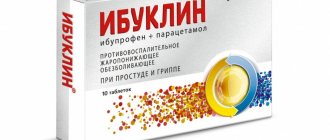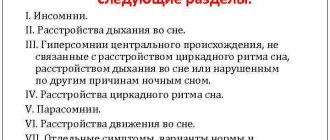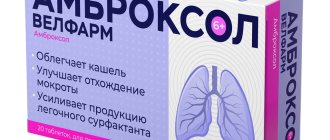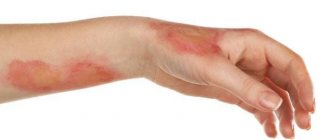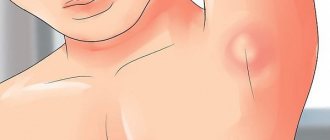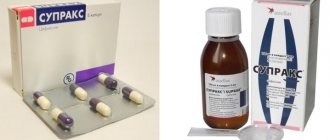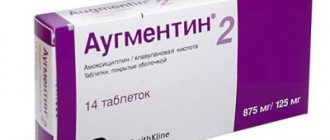1.General information
Cough is a spastic, repeated contraction of the muscles associated with the respiratory tract. The natural purpose of such a reflex, which most often occurs in response to irritation of the ENT organs and structures of the respiratory system, is to forcefully cleanse the lumen of the airways. A distinction is made between dry (unproductive) and wet cough (productive, colloquially “wet”, “expectorant”, i.e. accompanied by the separation of mucous masses).
Often there is a transformation of a dry cough into a wet one and vice versa.
In general, a persistent, clearly pathological cough is one of the most common reasons for seeking medical help (according to Western data, from 10 to 40 percent of all visits to the doctor are caused by a cough as the only complaint). In this case, dry cough is more common; For patients, it is more uncomfortable, often painful, debilitating and difficult to treat. There are many reasons and factors that cause such conditions; in some cases, these causes are found outside the respiratory system or nasopharynx. Thus, dry cough remains an acute problem for several areas of modern medicine.
Sign up for a consultation
A must read! Help with hospitalization and treatment!
Symptomatic therapy
Cough caused by natural causes goes away quickly after the irritating factor is eliminated. Until the causes of a pathological superficial cough are clarified, rinsing with antiseptics, local anesthetics (if combined with sore throat and sore throat), moisturizing and softening inhalations can be recommended. Self-administration of antibiotics and antitussives is unacceptable. A persistent cough lasting more than 7-10 days, with increasing shortness of breath and difficulty swallowing, is an indication for emergency medical attention.
2. Reasons
The main causes of nonproductive cough include:
- irritation of the respiratory tract by chemical and/or physical factors (toxic substances, aggressive fumes, active or passive smoking, dusty air, thermal effects, etc.);
- foreign bodies;
- mechanical pressure on the airways from the aortic aneurysm, growing tumor, enlarged lymph nodes;
- chronic obstructive pulmonary disease (COPD);
- fibrosing processes (proliferation of scar-connective tissue);
- bronchial asthma;
- respiratory infections (including pulmonary tuberculosis);
- allergic reactions;
- diseases of the esophagus and stomach, occurring with reflux syndrome;
- occupational pneumoconiosis;
- cardiovascular diseases (for example, left ventricular failure);
- long-term use of ACE inhibitors (angiotensin-converting enzyme);
- diseases of the central nervous system (damage to a special “cough” center in the medulla oblongata causes the so-called cough of central origin);
- thyroid diseases;
- high altitude hypoxia.
In many cases, a dry cough is caused not by one reason, but by two, three or more.
Visit our Pulmonology page
Dry cough in a child
Dry cough in children is the most common phenomenon. A child with a dry cough should be seen by a medical specialist in the following cases:
- The cough is dry, barking, paroxysmal and annoying in nature;
- The child’s cough begins unexpectedly, in an attack, persists for a long time, and there is a feeling that the child has something in his throat;
- Cough prevents a child from falling asleep at night;
- Cough causes vomiting;
- Cough is accompanied by severe allergies;
- The child has an elevated body temperature, general malaise with a cold;
- The cough continues to get worse.
Such a dry cough in a child is a symptom of one of the diseases, and a medical specialist must determine which one. If a foreign object enters the nasopharynx and the development of allergic reactions in the child is excluded, then we are talking about an infectious-inflammatory disease of the respiratory system.
3. Symptoms and diagnosis
There are acute, subacute and chronic non-productive cough. The main criterion is the persistence of symptoms: if the cough is reduced within 3 weeks, it is considered acute; if it persists for more than 8 weeks, it is said to be chronic. In many cases, a dry cough is accompanied by a number of additional symptoms: chest pain, headache, weakness, shortness of breath, weight loss, etc.
Today, the exact cause or causes of a nonproductive cough can be established, according to various estimates, in 90-100% of cases, although sometimes this requires an in-depth examination and takes some time. The first diagnostically significant sign for a specialist is the nature of the cough; There are such varieties as:
- barking (usually with lesions of the trachea or larynx);
- small and frequent (pleural pathology);
- bitonal (tumor processes);
- night "heart";
- whistling asthmatic, etc.
Anamnesis is studied, examination, auscultation, and percussion examination of the chest are performed. In case of diagnostic doubts or ambiguities, laboratory tests of blood, urine, sputum (if the required amount can be collected with a dry cough), radiographic and/or tomographic studies, bronchoscopy, diagnostic bronchoalveolar lavage (wash), biopsy and other procedures as indicated are prescribed. As necessary, specialized specialists are involved (oncologist, infectious disease specialist, neurologist, etc.).
About our clinic Chistye Prudy metro station Medintercom page!
Survey
Since in most cases the presence of a superficial cough indicates damage to the upper respiratory tract, at the first stage of the diagnostic search the condition of the nasal cavity, pharynx, and larynx is clarified, and only after that other possible causes are excluded. The organization of the examination is usually carried out by an ENT doctor, who, according to indications, prescribes consultations with specialized specialists. The following are recommended as screening tests:
- Instrumental inspection methods
. During rhinoscopy, pharyngoscopy and laryngoscopy, the condition of the mucous membrane of the upper respiratory tract is assessed. The examination reveals inflammatory processes, erosive changes, and space-occupying formations. - Microbiological and serological studies
. To search for pathogens, culture of swabs from the nose, pharynx and laryngeal mucosa is used. Effective ways to confirm the infectious nature of a cough and identify the pathogen are ELISA, RIF, and PCR.
At the next stages of diagnosis, contrast radiography of the esophagus and esophagoscopy are performed to exclude Zenker's diverticulum. If a superficial cough is suspected to be of allergic origin, allergy tests are prescribed. An informative method for diagnosing malignant tumors of the thyroid gland is ultrasound of the organ. In the absence of organic causes of coughing, a neurological examination is recommended.
Instrumental examination of the upper respiratory tract
4.Treatment
Obviously, treating a dry cough means asking the question incorrectly. Therapy is always aimed at eliminating the causes, i.e., a pathological process or condition diagnosed during examination. Often the first priority is to change the nature of the cough to a productive, naturally cleansing one; For these purposes, the so-called expectorants or mucoregulators, herbal remedies, physiotherapeutic procedures.
Drugs are often prescribed that suppress the cough reflex itself. It should, however, be understood: given the variety of possible causes described above, as well as the huge range of antitussive medications available in pharmacies without a prescription, self-medication is simply dangerous, and any specific recommendations are inappropriate here. Any prescriptions of this kind should be made exclusively by a doctor and based on the results of an objective diagnosis.
Sign up for a consultation
What helps with wet cough?
So, when choosing a medicine, it is important to accurately determine whether your cough is dry or wet. A doctor can make the correct prescription: a therapist will help adults, but the child should be shown to a pediatrician. In difficult cases, you may need the help of a pulmonologist, infectious disease specialist, or allergist.
Quick help for cough
For wet or productive cough, mucolytic and expectorant agents are effective.
Mucolytic drugs. Mucolytics help thin sputum (secret), making it easier to remove. Medicines in this group are prescribed for the treatment of bronchitis, pneumonia, tracheitis and a number of other respiratory diseases. There are direct and indirect mucolytics.
Direct acting mucolytics act directly on the bronchial glands. Mucoregulators (reflex mucolytics) cause irritation of the nerve endings of the gastric mucosa.
This group of drugs includes Acetylcysteine, Ambroxol, ACC, Bromhexine, Carbocisteine, Coldrex, Lazolvan, Mucaltin, Sobrerod, etc. Mucolytics can also be used in patients with dry cough, but as part of combination therapy (together with other auxiliary drugs) and under supervision doctor
Expectorants. Taking these drugs is indicated in cases where it is necessary to intensify the process of cleansing the respiratory tract. When taking the medicine, irritation of the mucous membranes of the bronchi occurs, and as a result, a cough occurs, which allows you to remove sputum (remember: mucolytics dilute sputum, expectorants help to remove it better). The list of the most famous expectorants includes Guaifenesin, Stoptussin, Coldrex Broncho. The main active components of many expectorants are plant extracts, for example, the formula of the well-known drug Alteika includes marshmallow roots.
To treat wet cough, anti-inflammatory drugs with a bronchodilator and/or expectorant effect may be recommended as part of complex therapy. This category includes Ascoril, Prospan, Sinupret, Gedelix, etc. The peculiarity of this group of drugs: they help relieve spasm in the respiratory tract, which can also be the cause of cough.
Which doctors should I contact about a cough?
To determine the causes of cough, diagnose the condition and treat it, you must consult a therapist or pediatrician. If your cough doesn't go away within a few weeks, make an appointment with a pulmonologist or gastroenterologist (if you have acid reflux or established GERD).
A cough that occurs due to a cold or flu usually goes away on its own. You need to drink as much fluid as possible and get plenty of rest; to relieve pain and reduce high fever, you can take paracetamol or ibuprofen (attention: you should not give aspirin to children to reduce fever, its use is associated with the development of Reye's syndrome).
The effectiveness of multi-ingredient over-the-counter cough and cold medications in relieving symptoms is questionable. Research shows that not only do they not improve the condition, but they may have potentially serious side effects. They may also contain paracetamol and may cause an overdose if you are already taking it. It is not recommended to give over-the-counter multi-ingredient cough and cold medicines to children under 12 years of age. Cough lozenges (for children over 4 years old) and honey (for children over 1 year old), humidification and ventilation of the room can alleviate the condition.
Author:
Amelicheva Alena Aleksandrovna medical editor
Useful tips
To help the body overcome the disease and eliminate its symptoms, following a few simple tips (in addition to the treatment regimen, and not instead of it):
- try to breathe exclusively through your nose so as not to irritate the mucous membranes of your throat;
- drink more still water and warm liquids (milk with butter and honey, rose hip, licorice and marshmallow tea, with raspberries, viburnum, sea buckthorn, ginger);
- humidify the air in the room where the cough sufferer is located and walk in the fresh air;
- do inhalations (the old fashioned way over a pan of steam or using a special nebulizer);
- do not speak loudly or scream - this is completely unacceptable when coughing and will only aggravate the situation;
- carry out warming procedures for your hands and feet.
It is important not to interrupt the treatment process until the cough is completely defeated, and not to stop halfway. Even if you feel much better, this does not mean that the disease is completely defeated. Untreated diseases can lead to serious consequences in the form of complications, so contact the specialists of the MedCom network of clinics in a timely manner.
